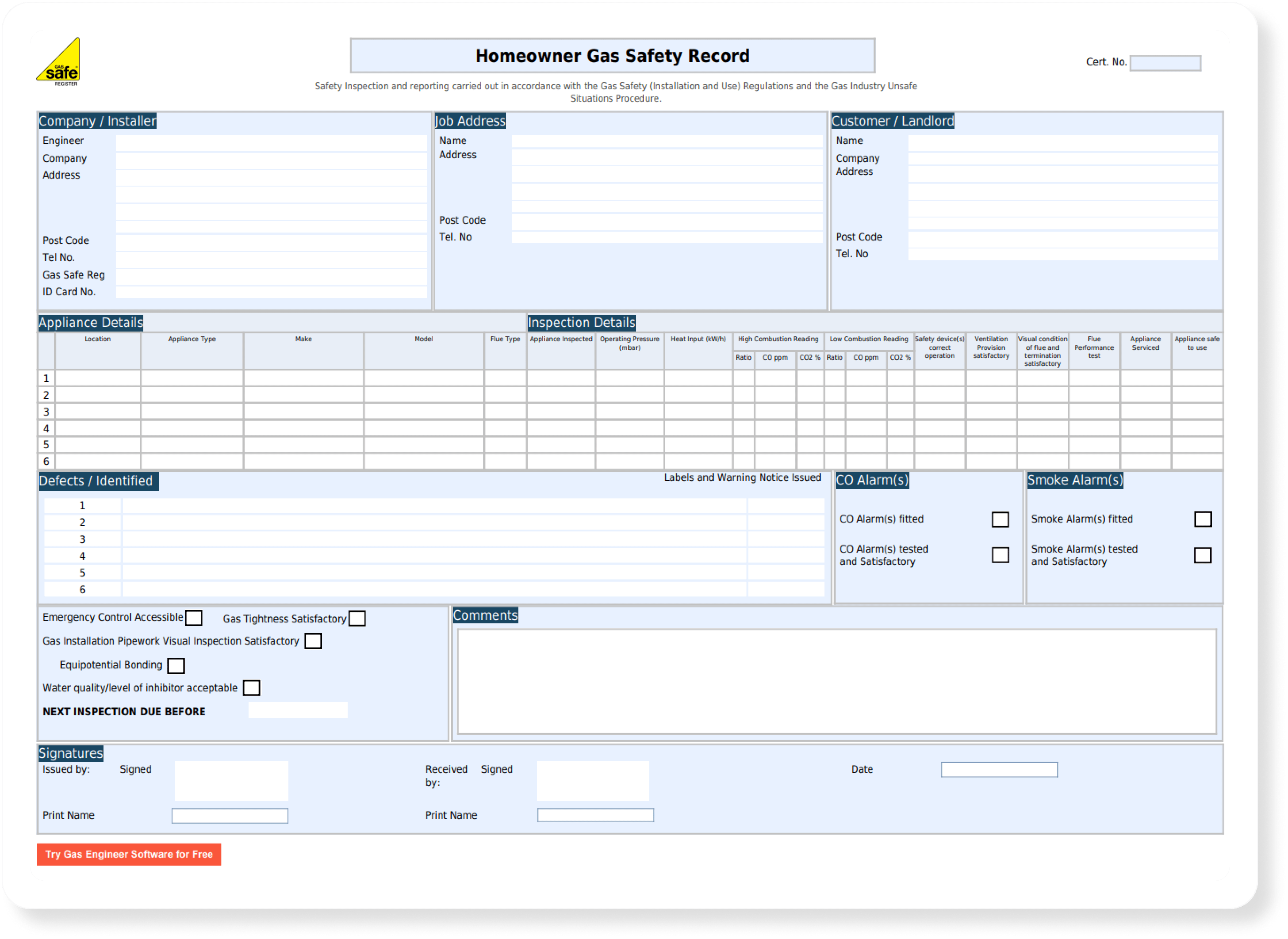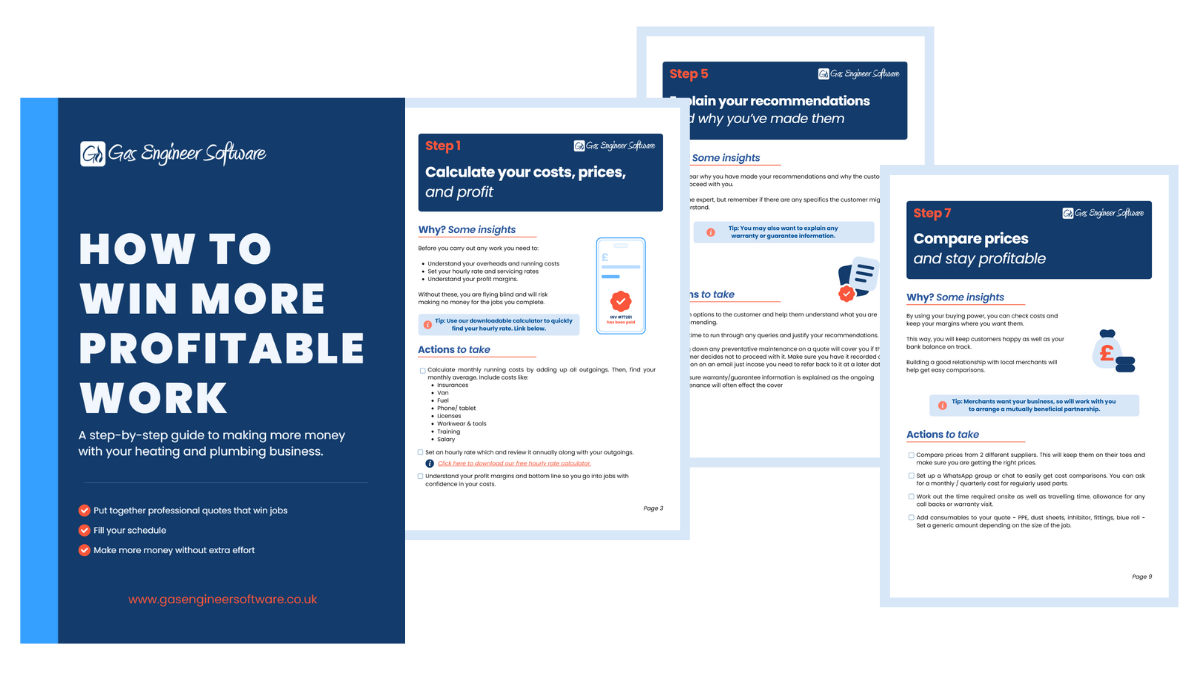How the Needs of your Heating Business Change As You Grow
![[Featured Image] Needs of a gas business-min As your company grows, it's needs evolve](https://gasengineersoftware.co.uk/wp-content/uploads/2023/10/Featured-Image-Needs-of-a-gas-business-min.png)
Running your own heating & plumbing business can be extremely rewarding, but as a business grows and evolves, so do its challenges and needs: The tools and processes used by a sole trader should be vastly different to that of a team of engineers and admin staff.
The difficulty is that it’s not always easy to predict needs before they’re actually needed. In an ideal world, you want to be proactive rather than reactive. In other words, it’s best to implement changes before and as you grow, not after.
This article will help describe the various stages of growth a heating and plumbing company might go through, as well as its core challenges and needs along the way. Hopefully it will provide some insight into what comes next and what you should be preparing for.
To start, let’s classify the 3 main stages of growth:
1. Starting out as a sole trader. Almost all gas engineers begin their business as a sole trader. This means you do all the jobs and most (if not all) of the paperwork yourself.
2. Hiring your first engineer. As businesses mature and start finding more work, working with another engineer can help spread the workload and increase capacity.
3. Hiring your first admin staff. With more employees and more jobs comes more paperwork that requires dedicated admin staff to handle.
We’ve put this article together to help anyone running (or thinking of starting) a trades business understand the importance of having the right tools and processes in place as the business grows.
Stage 1: When you’re starting out
Top Challenges
By far the biggest challenge of being a sole trader is having to juggle so many roles. You’ve got to handle all your usual gas engineer responsibilities alongside being a salesperson, administrator, accountant, and marketer. This makes time one of your most valuable resources, and work-life balance tricky.
The other big challenge for sole traders appears when all this hard work pays off: it’s difficult to recognise when it’s time to expand your business and get the help you need to see it grow.
Because of these challenges, many of the needs of a sole trader business are related to saving time, reducing the burden of paperwork, and simplifying business-related tasks.
Key Needs
- Paperless certificates and records: To reduce the amount of time spent creating, organising, and storing gas safe certificates and other records. This will also make them easier to access when needed and take up less physical office space.
- A way of managing and scheduling jobs: To guarantee jobs never get dropped or forgotten about, and that you don’t have to constantly flip through a physical diary (which can get lost or misplaced) to find your next availability.
- Quote and invoice generators: To help quickly create consistently professional-looking quotes and invoices, track their status, and keep safe on the cloud.
- Reliable, clear, and effective communication: To help provide a better and more personalised service to your clients, foster long-term relationships, and give them an easy way to get in touch with you.
- A simple way of finding jobs: Your existing customers are cheaper and easier to book jobs for. Tools like automated reminders are a great way to consistently and effortlessly find work. Do good work and word-of-mouth, referrals, and recommendations should do most of the heavy lifting for new customers.
Stage 2: When you hire your first engineer
Sole traders each have their own way of running their business – as is part of the attraction – but they are all still fundamentally the same. The next big leap comes when you recognise you need help to complete jobs and hire an engineer. This could mean you’ve been turning down work, working overtime, or having to cut some corners.
At this point, your job becomes two-sided. While you still get hands-on with jobs, you’re now also in charge of an employee and need to manage their time as well as your own.
Top Challenges
Granted, time will always be an issue – but you should hopefully have less busy days after hiring a new employee. The three main challenges in this stage come in the form of increased responsibility, maintaining your business’ reputation, and effective team communication.
Many of the systems, processes and tools required at this stage are centred around the transition from working alone to with a partner.
Key Needs
- Training new employees: Use tools and processes to help them get the hang of things quickly and efficiently and hit the ground running. They’ll be able to start sharing your workload faster, and have a much more pleasurable first few months.
- A system for delegation: So you can decide how best to allocate tasks. You and your new employee may have areas of expertise and specialties. If so, make sure to factor this into task allocation.
- Quality control measures: To keep up the reputation you’ve earned for your business, you need to make sure that your new employee understands what’s expected.
- Scheduling: With tools that help you assign and allocate jobs evenly and fairly when working in a team.
Stage 3: When you hire your first admin staff
Top Challenges
Without a doubt, the two greatest challenges of running a fully-fledged company like this is retaining quality and diversifying your skillset. This is because trades businesses depend so much on their reputation and long-term customer relationships.
As you grow, you need to ensure all your employees are representing your brand name to your standards. Meanwhile, you’ll be practising less hands-on gas engineer skills now. Instead, you’ll have to learn how to run a business and be an entrepreneur.
Key Needs
- Team collaboration: As your team grows, you’ll need the systems and processes necessary to promote efficient teamwork. Software integrations are a big help, bridging the gap between field and office teams for things like data entry.
- Reporting: As a manager and business leader, it will benefit you greatly to have insights into financials, job performance, and more to help identify areas for growth and improvement. These reports can help condense vague ideas into something digestible and useful.
- Organised record keeping: A bigger business means more customer data, records, and certificates to handle. A detailed, organised, and cloud-based system is a must for modern day businesses to avoid things getting lost and make them easily accessible.
- Advanced scheduling and workflow analysis: To ensure you are using your employees time efficiently and workloads are balanced appropriately. Cloud-based scheduling also means that all team members can have access to calendars that update in realtime.
- Customer management: As a bigger business, you will no longer be able to handle customer relationships yourself. You’ll need a system in place so all team members can contribute to long-term and healthy client relationships. This may include keeping customers up to date on job progress, handling complaints, implementing feedback, and more.
- Quality control & performance tracking: To ensure each team member is upholding the brand name and contributing appropriately to its success. This is more about checking whether they have everything they need and the right mindset to actually do the job right. Issues that require extra visits damage your company’s reputation and cost far more than spending a little extra time in the first place.
Conclusion – a roadmap for growth
Above all else, growing a successful heating & plumbing business requires flexibility and adaptiveness. With each new stage of growth comes a new set of challenges and hurdles to pass, but also extremely fulfilling rewards and accomplishments.
Recognising these challenges and their solutions is crucial, and will help you charter your own path towards success. You’ll be able to drive a business that evolves alongside your career from gas engineer to entrepreneur, filled with new and valuable experiences each step of the way.
Whether it’s mastering the role of a sole trader, manager, or business leader, a big part of this journey will relate back to your decision to use all the tools and resources at your disposal. With the right guidance, software, and dedication, you’re well on your way to growing a sustainable and reputable business. Just remember – as your business expands, so too should your strategies, mindset, and solutions.
Next steps:
If you’ve been thinking about implementing software into your workflow to save time, here’s what you can do next:
- Visit our resources centre where you'll find more articles like this one and our free gas rate calculator.
- Start a free trial to see exactly how our software works for your business.
- Watch our video demo to get an idea of how our software works. You can also book a 1-on-1 session with our customer success team for a more personalised experience.
- Know an engineer who's still using paper? Help them and us out by sending our software their way!

